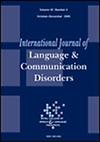Speech–Language Pathologists’ Perceptions of Their Competence in Managing Stuttering: A Systematic Review with Narrative Synthesis
Abstract
Background
Stuttering can significantly impact an individual's quality of life and has the potential to affect social interactions, academic and career opportunities, and well-being. Speech–language pathologists (SLPs) play a crucial role in the treatment of stuttering across the lifespan.
Aims
This systematic review aimed to describe (1) how competent SLPs perceive themselves to be in their management of stuttering and (2) the factors that influence SLPs’ perceived competence in managing stuttering.
Methods
A comprehensive search of eight electronic databases resulted in 13 studies that met the inclusion criteria. A narrative synthesis was completed on the extracted data.
Main Contribution
Competence was perceived to be lower in treatment than in assessment. Perceived competence was higher in SLPs who saw people who stutter more frequently and engaged in more continuing professional education in stuttering. Factors affecting SLPs’ perceived competence also included: the level of support to implement treatment, knowledge of stuttering, formal education in stuttering, years of experience as an SLP, experiences with stuttering, familiarity with people who stutter, previous treatment outcomes and the perceived complexity of stuttering. The available data were primarily focused on participants working in paediatric populations.
Conclusions
The review revealed diversity in perceived competence when managing stuttering, influenced by factors related to SLPs’ professional and personal experiences, the practice context and available evidence, with notable variation in competence across different settings and regions. Further research is required across the lifespan to better understand the relationships between factors and to guide future interventions for competence.
WHAT THIS PAPER ADDS
What is already known on the subject
- Research has identified gaps in SLPs’ knowledge, clinical experience and confidence in treating stuttering. These studies highlighted SLPs’ limited awareness of effective interventions, varying levels of perceived competence across different age groups, low preference for treating stuttering and difficulty applying clinical trial evidence. This study was needed to consolidate these findings and examine factors influencing SLPs’ perceived competence in stuttering management.
What this paper adds to the existing knowledge
- This review provides a synthesis of SLPs’ perceptions of their competency in managing stuttering and identifies key factors influencing competency. It details perceived competence of stuttering treatment across the lifespan, in assessment and treatment. Additionally, it explores factors such as experience with stuttering, level of support, the practice context, familiarity with people who stutter, the perceived complexity of stuttering and previous treatment outcomes. These findings have implications for stuttering treatment and guiding professional development.
What are the potential or actual clinical implications of this work?
- The findings of this review emphasise the importance of ongoing education and support for SLPs to enhance their clinical competence in stuttering management. Specifically, targeted professional development, supportive work environments and familiarity with people who stutter can positively impact SLPs’ confidence and proficiency. The results reinforced the need for SLPs whose caseloads include stuttering to prioritise ongoing education in stuttering, seek support to implement treatment where needed and pursue opportunities to gain experience with people who stutter. These insights can inform the development of guidelines and training programmes to improve SLPs’ competence and ultimately benefit people who stutter.


 求助内容:
求助内容: 应助结果提醒方式:
应助结果提醒方式:


